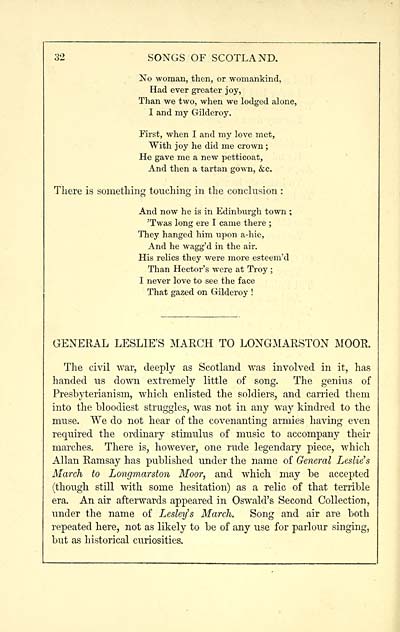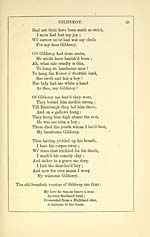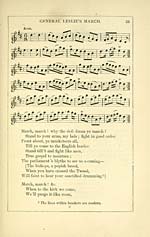Glen Collection of printed music > Printed text > Songs of Scotland prior to Burns
(36) Page 32 - General Leslie's march to Longmarston Moor
Download files
Complete book:
Individual page:
Thumbnail gallery: Grid view | List view

32 SONGS OF SCOTLAND.
No woman, then, or womankind,
Had ever greater joy,
Than we two, when we lodged alone,
I and my Gilderoy.
First, when I and my love met,
With joy he did me crown ;
He gave me a new petticoat,
And then a tartan gown, &c.
There is something touching in the conclusion :
And now he is in Edinburgh town ;
'Twas long ere I came there ;
They hanged him upon a-hie,
And he wagg'd in the air.
His relics they were more esteem'd
Than Hector's were at Troy ;
I never love to see the face
That gazed on Gilderoy !
GENERAL LESLIE'S MARCH TO LONGMARSTON MOOR.
The civil war, deeply as Scotland was involved in it, has
handed us down extremely little of song. The genius of
Presbyterianisrn, which enlisted the soldiers, and carried them
into the bloodiest struggles, was not in any way kindred to the
muse. We do not hear of the covenanting armies having even
required the ordinary stimulus of music to accompany their
marches. There is, however, one rude legendary piece, which
Allan Ramsay has published under the name of General Leslie's
March to Longmarston Moor, and which may be accepted
(though still with some hesitation) as a relic of that terrible
era. An air afterwards appeared in Oswald's Second Collection,
under the name of Lesleijs March. Song and air are both
repeated here, not as likely to be of any use for parlour singing,
but as historical curiosities.
No woman, then, or womankind,
Had ever greater joy,
Than we two, when we lodged alone,
I and my Gilderoy.
First, when I and my love met,
With joy he did me crown ;
He gave me a new petticoat,
And then a tartan gown, &c.
There is something touching in the conclusion :
And now he is in Edinburgh town ;
'Twas long ere I came there ;
They hanged him upon a-hie,
And he wagg'd in the air.
His relics they were more esteem'd
Than Hector's were at Troy ;
I never love to see the face
That gazed on Gilderoy !
GENERAL LESLIE'S MARCH TO LONGMARSTON MOOR.
The civil war, deeply as Scotland was involved in it, has
handed us down extremely little of song. The genius of
Presbyterianisrn, which enlisted the soldiers, and carried them
into the bloodiest struggles, was not in any way kindred to the
muse. We do not hear of the covenanting armies having even
required the ordinary stimulus of music to accompany their
marches. There is, however, one rude legendary piece, which
Allan Ramsay has published under the name of General Leslie's
March to Longmarston Moor, and which may be accepted
(though still with some hesitation) as a relic of that terrible
era. An air afterwards appeared in Oswald's Second Collection,
under the name of Lesleijs March. Song and air are both
repeated here, not as likely to be of any use for parlour singing,
but as historical curiosities.
Set display mode to: Large image | Transcription
Images and transcriptions on this page, including medium image downloads, may be used under the Creative Commons Attribution 4.0 International Licence unless otherwise stated. ![]()
| Special collections of printed music > Glen Collection of printed music > Printed text > Songs of Scotland prior to Burns > (36) Page 32 - General Leslie's march to Longmarston Moor |
|---|
| Permanent URL | https://digital.nls.uk/90576170 |
|---|
| Description | Scottish songs and music of the 18th and early 19th centuries, including music for the Highland bagpipe. These are selected items from the collection of John Glen (1833 to 1904). Also includes a few manuscripts, some treatises, and other books on the subject. |
|---|
| Description | The Glen Collection and the Inglis Collection represent mainly 18th and 19th century Scottish music, including Scottish songs. The collections of Berlioz and Verdi collected by bibliographer Cecil Hopkinson contain contemporary and later editions of the works of the two composers Berlioz and Verdi. |
|---|

